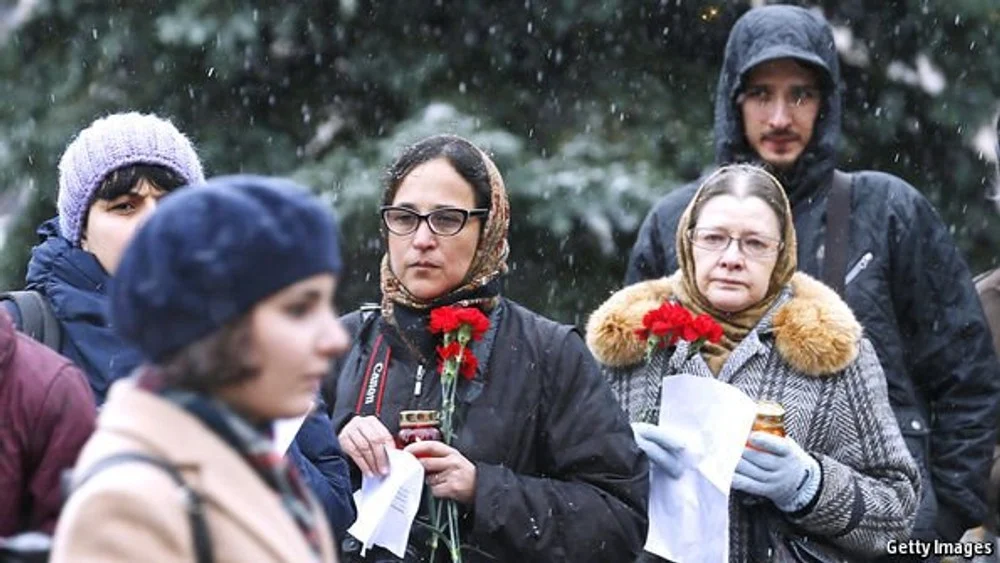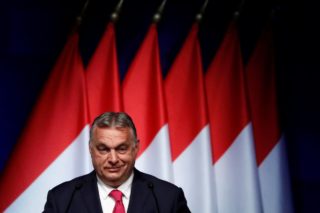MOSCOW — “HE WHO controls the past controls the future. He who controls the present controls the past,” George Orwell wrote in “1984”. As Russia’s politics grows more Orwellian, the fight over its past is heating up. The Kremlin’s latest target is Memorial, the country’s most respected human-rights group, set up in the 1980s to commemorate victims of Stalin’s terror.
On October 29th thousands of people queued in a park opposite the headquarters of the agency once known as the KGB to read out the names of some of those whom Stalin had executed. The park features a monument to those victims, a large stone brought from the Solovetsky Islands, site of one of the first Soviet labour camps. Volunteers handed out bits of paper with names printed on them: “Zherebenkov, Dmitry Filatovich, 57, a worker in a cement factory. Executed on September 21st 1937. Zherikov, Semen Nikiforovich, 26, a labourer in a limestone quarry. Executed on March 9th 1938.”
The event has been held annually for ten years, but Arseny Roginsky, Memorial’s chairman, said he had never seen so many people. Ordinary Muscovites kept arriving from 10am until 10pm, undeterred by rain and snow. The names they managed to read were a drop in the bucket of Stalin’s terror. In the peak years of 1937 and 1938, according to Memorial’s figures, at least 30,000 people were executed in Moscow, and 700,000 throughout the country.
Memorial was perhaps the most successful civic institution created during Mikhail Gorbachev’s perestroika reforms. Among the founders was Andrei Sakharov, the Nobel Prize-winning physicist and human-rights activist. Another member of the original group was Mr Roginsky, a historian jailed in 1981 for publishing a samizdat almanac entitled Pamyat (“Memory”). By the time of his release in 1985, the word pamyat had become the name of an anti-Semitic nationalist movement. Mr Roginsky’s group ended up adopting the foreign-sounding name “Memorial”.
In the wars in Chechnya beginning in the 1990s, Memorial investigated and denounced abuses by the Russian army, including murdering civilians and torturing detainees. Journalists came to rely on the group for information. Its human-rights activists were constantly under pressure; some, including Natalia Estemirova, lost their lives. But until recently, the group was allowed to pursue its historical activities untouched. No longer. Last month the government declared Memorial a “foreign agent”—once a Stalinist term for traitors, now a legal classification intended to throttle troublesome civil-society groups.
The foreign-agents law was introduced in 2012, at the outset of Vladimir Putin’s third presidential term. It required any organisation receiving money from abroad and engaging in “political activity” to register. At first, none did. The issue was not the money—charities with foreign donors were happy to acknowledge them—but the definition of “political activity”.
“We understand political activity as taking part in a competition for political power,” says Mr Roginsky. But under the Kremlin’s definition, any attempt to shape public opinion or influence government policy was “political activity”. In the case of Memorial this included statements objecting to the war in Ukraine and the killing of Boris Nemtsov, an opposition leader; and opposing the law on foreign agents.
Memorial must now label all of its publications—including lists of Stalin’s victims—as the work of a foreign agent. This will put pressure on anyone who comes into contact with the group, such as the thousands of teachers and schoolchildren from remote parts of the country who had participated in its education projects.
Fun with facts
That the Kremlin has struck against Memorial now is no surprise. In Mr Putin’s third presidential term, control over Russia’s history has become as important as control over television, oil and gas were in his first two. Unable to deliver economic growth, the Kremlin needs to cook up reasons to keep the population in a constant state of mobilisation against external threats. The way the propagandists tell it, Russia is surrounded by enemies and can only be defended by Mr Putin. The past is reshaped to fit this story. The second world war is presented as a Russian victory over the West; the government has commissioned new history books that present the Molotov-Ribbentrop pact to carve up Poland between the Soviet and Nazi regimes as a self-defence measure.Even national security organs are caught up in the struggle over the past. According to Kommersant, a daily, a recent meeting of Russia’s security council focused on measures to prevent the “falsification” of history by foreign states and international organisations. It identified six sensitive historical issues, including the ethnic policy of the Russian empire, Russia’s role in defeating fascism in the second world war, and “political crises” (read: Soviet crackdowns and invasions) in East Germany, Hungary and Czechoslovakia.
Mr Putin derives his legitimacy not from free elections, but from a historical narrative that links him to the long procession of Russia’s rulers. This starts with Prince Vladimir the Great, the tenth-century ruler of the Kievan Rus proto-state that Russians see as the progenitor of their own. Mr Putin has just had a huge statue of Vladimir erected opposite the Kremlin; another Russian city recently built one of Ivan the Terrible (see article). Stalin, who is presented as a strong imperial ruler, is another role model. Olga Vasilyeva, a religious nationalist recently appointed as education minister, has praised the Soviet dictator for restoring state patriotism to the centre of Russian history: “The highest interest of any citizen is the interest of the nation.”
Russian liberals are not surrendering their history easily. The more pressure the state applies to Memorial, the stronger is the counter-reaction. The past few years have seen the birth of a grassroots movement calling itself “last address”. Volunteers erect plaques at the final known addresses of those who were arrested in the Stalin years and never returned. Although supported by Memorial, it has no formal organisation that can be shut down.
Mr Roginsky says Memorial now faces three key tasks: “We must not let them kill us, we must retain our dignity and we must carry on our work.” Judging by the growing number of plaques on Russian houses and the lines of people queuing up to read out the names of Stalin’s victims, the fight is far from over.
By The Economist





